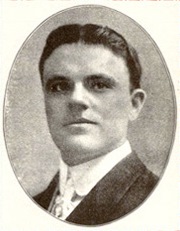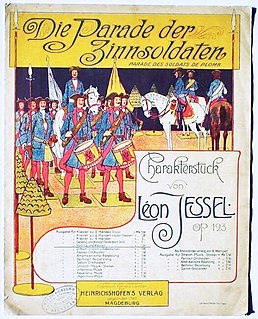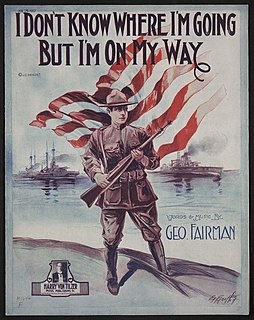
This is a list of notable events in music that took place in the year 1929.
This is a list of notable events in music that took place in the year 1920.

William Thomas Murray was one of the most popular singers in the United States in the early 20th century. While he received star billing in vaudeville, he was best known for his prolific work in the recording studio, making records for almost every record label of the era.

Milton Ager was an American composer, regarded as one of the top songwriters of the 1920s and 1930s. His most lasting compositions include "Ain't She Sweet?” and “Happy Days Are Here Again”.
Jack Selig Yellen was an American lyricist and screenwriter. He is best remembered for writing the lyrics to the songs "Happy Days Are Here Again", which was used by Franklin Roosevelt as the theme song for his successful 1932 presidential campaign, and "Ain't She Sweet", a Tin Pan Alley standard.
"Jeepers Creepers" is a popular song and jazz standard. The music was written by Harry Warren and the lyrics by Johnny Mercer for the 1938 movie Going Places. It was premiered by Louis Armstrong and has been covered by many other musicians. The song was nominated for the Academy Award for Best Original Song in 1938 but lost to "Thanks for the Memory". The song was included in the 1984 Smithsonian collection American Popular Song: Six Decades of Songwriters and Singers and in the 1998 Warren's CD collection The Songs Of Harry Warren.

Achinoam Nini, also known professionally as Noa (נועה), is an Israeli singer-songwriter, percussionist, poet, composer, and human rights activist working internationally. She is accompanied by guitarist Gil Dor and often plays the conga drums and percussions as she sings. Noa represented Israel at the Eurovision Song Contest in 2009 together with singer Mira Awad, with the song "There Must Be Another Way". Her music is known to fuse languages and styles. She has performed in 52 countries and was the first Israeli artist to perform in the Vatican.
"I'm Getting Sentimental Over You" is a song recorded by Tommy Dorsey and His Orchestra. The words were written by Ned Washington and the music was written by George Bassman. It was first performed in 1932. The original copyright is dated 1933 and issued to Lawrence Music Publishers, Inc. The copyright was assigned to Mills Music, Inc. in 1934. Noni Bernardi, a saxophonist with the Dorsey orchestra arranged this song.

Anita Jean Grilli, known professionally as Anita Kerr, is an American singer, arranger, composer, conductor, pianist, and music producer. She recorded and performed with her vocal harmony groups in Nashville, Los Angeles, and Europe.

"Down by the Old Mill Stream" is a song written by Tell Taylor. It was one of the most popular songs of the early 20th century. The publisher, Forster Music Publisher, Inc., sold 4 million copies.

"Hot Lips" or "He's Got Hot Lips When He Plays Jazz" is a popular song written by jazz trumpeter Henry Busse, Henry Lange, and Lou Davis. The song was a number one hit for Paul Whiteman and His Orchestra. Henry Busse was a founding member of the Paul Whiteman Orchestra, joining in 1918.

The Parade of the Tin Soldiers, also known as The Parade of the Wooden Soldiers, is an instrumental musical character piece, in the form of a popular jaunty march, written by German composer Leon Jessel, in 1897.
Bert L. Rule(néAlbert Lyman Rule; 12 August 1891 Brooklyn; – 17 August 1978 East Patchogue, New York) was an American composer, arranger, singer, and pianist of popular songs of Tin Pan Alley and the vaudeville genre. Rule composed and published his music, some of which became national hits, from 1913 to 1934. He worked in publishing houses, namely M. Witmark & Sons and performed in vaudeville theaters throughout the country roughly during the same period.

"I Want a Girl " is a popular song of 1911 composed by Harry Von Tilzer and with lyrics by William Dillon, which has become a barbershop quartet standard.

"Blue Jeans" is a song by American singer-songwriter Lana Del Rey for her studio album Born to Die (2012). It was released on April 8, 2012, by Interscope Records as the third single from the record. Produced by Emile Haynie, the song was written by Del Rey, Haynie, and Dan Heath. It is a downtempo ballad with hip hop influences. Charting across Europe and Asia, "Blue Jeans" reached the top 10 in Belgium, Poland, and Israel. Three music videos were created for the song. The first was self-produced and the second shows Del Rey stands at a microphone in a bland room, accompanied by an electric guitarist. The third, which is the official one, was shot and directed by Yoann Lemoine, featuring film noir elements and crocodiles. A controversial performance of the song on Saturday Night Live placed Del Rey under scrutiny and polarized opinion, though the song itself received acclaim from critics.
Harry David Kerr was an American songwriter, lyricist, author, and lawyer. Kerr became active in music at age 15 (1895). The practice of law had been his prime avocation until 1920, when he decided to focus on songwriting. But he still continued to use his legal training in music. In 1922, while living in New York City, Kerr prepared the incorporation documents for the American Society of Composers, Authors and Publishers (ASCAP), of which he had become one of 90 charter members at its founding in 1914.
Harry Baisden was an American composer of popular music, arranger, pianist, and an acclaimed dance orchestra leader. While a musician in the U.S. Army 2nd Infantry Band during World War I, Baisden composed several popular wartime songs, namely "Iowa, We Owe A Lot To You," "Meet Me At The Red Cross Ball," "I'll Steal You," and "Camp Cody Blues."
Transportation ballads are a genre of broadside ballad some of which became an important part of the folk song traditions of Britain and Ireland. They concern the transportation of convicted criminals firstly to the American colonies and then to penal colonies in Australia. Transportation ballads were published as broadsides,. Many have passed into the folk tradition and have been collected subsequently from traditional singers.

George Wayne Fairman (1881–1962) was a lyricist, composer, and music publisher whose work includes popular songs. Several of his songs charted including two that reached #1. Fairman's work includes coon songs, ragtime, songs related to World War I, and a foxtrot.











